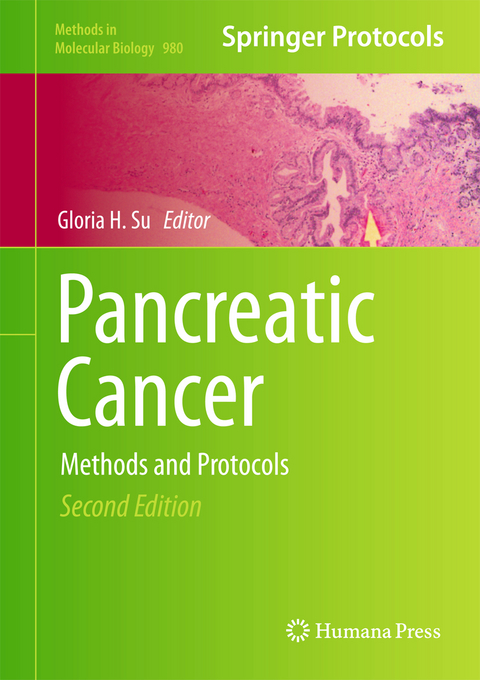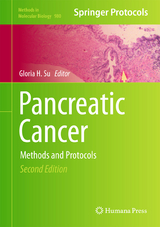Pancreatic Cancer
Humana Press Inc. (Verlag)
978-1-62703-286-5 (ISBN)
Pancreatic ductal adenocarcinoma is the fifth leading cause of cancer death in the USA. Pancreatic cancer develops as a result of the accumulation of genetic and epigenetic alterations in cancer-causing genes such as oncogenes and tumor-suppressor genes. The second edition of Pancreatic Cancer: Methods and Protocols provides a broad range of protocols for molecular, cellular, pathological, and statistical analyses of sporadic and familial pancreatic cancer. It covers topics from in-vitro cell cultures to in-vivo mouse models, DNA to protein manipulation, and genetic and epigenetic analyses to treatment development. Written in the highly successful Methods in Molecular Biology™ series format, chapters include introductions to their respective topics, lists of the necessary materials and reagents, step-by-step, readily reproducible laboratory protocols, and key tips on troubleshooting and avoiding known pitfalls.
Authoritative and practical, written by highly renowned investigators with expertise in pancreatic cancer, Pancreatic Cancer: Methods and Protocols, Second Edition is an invaluable source of proven protocols to those who are interested in joining the fight against pancreatic cancer.
Identification and Analysis of Precursors to Invasive Pancreatic Cancer.- Tissue Microarrays: Construction and Use.- Immunohistochemistry of Pancreatic Neoplasia.- A Method for Conducting Highly Sensitive microRNA in situ Hybridization and Immunohistochemical Analysis in Pancreatic Cancer.- Optimal Molecular Profiling of Tissue and Tissue Components: Defining the Best Processing and Microdissection Methods for Biomedical Applications.- Considerations for Sequencing Analyses of Pancreatic Cancer Progression and Metastasis.- DNA Methylation Analysis in Human Cancer.- Quantitative Real-Time PCR Expression Analysis of Peripheral Blood Mononuclear Cells in Pancreatic Cancer Patients.- Development of a Cytokine-modified Allogeneic Whole Cell Pancreatic Cancer Vaccine.- The Prevention and Genetics of Pancreatic Cancer – A Programmatic Approach.- Development of Orthotopic Pancreatic Tumor Mouse Models.- Evaluating Dietary Compounds in Pancreatic Cancer Modeling Systems.- Quantification of Murine Pancreatic Tumors by High Resolution Ultrasound.- Microdissection and Culture of Murine Pancreatic Ductal Epithelial Cells.- Sphere-forming Assays for Assessment of Benign and Malignant Pancreatic Stem Cells.- Analysis of Transplanted Bone Marrow Derived Cells in Chronic Pancreatitis.- Analysis of the Potential for Pancreatic Cancer Metastasis In Vitro and In Vivo.- The use of Fluorescent Probes in the Study of Reactive Oxygen Species in Pancreatic Cancer Cells.- Analysis of Tumor Associated Mucin Glycotopes by Western Transfer Methods.- Evaluating Tumor Angiogenesis.- Pooled Genome-wide RNAi Screenings.- Pooled ShRNA screenings: Computational Analysis.
| Reihe/Serie | Methods in Molecular Biology ; 980 |
|---|---|
| Zusatzinfo | XII, 389 p. |
| Verlagsort | Totowa, NJ |
| Sprache | englisch |
| Maße | 178 x 254 mm |
| Themenwelt | Medizin / Pharmazie ► Medizinische Fachgebiete ► Onkologie |
| Studium ► 2. Studienabschnitt (Klinik) ► Humangenetik | |
| Schlagworte | Cancer Biology • DNA to protein manipulation • epigenetic analyses • Genetic analyses • in-vitro cell cultures • in-vivo mouse models • Oncogenes • Pancreatic cancer • tumor-suppressor genes |
| ISBN-10 | 1-62703-286-X / 162703286X |
| ISBN-13 | 978-1-62703-286-5 / 9781627032865 |
| Zustand | Neuware |
| Haben Sie eine Frage zum Produkt? |
aus dem Bereich




